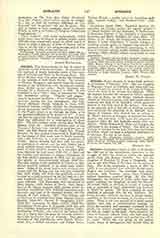

Adelaide, the Archdiocese of, has its center in Adelaide, capital of South Australia. It comprises all the territory of South Australia south of the counties of Victoria and Burra to Northwest Bend. The River Murray from this point forms the boundary to the confines of New South Wales. The counties of Flinders, Musgrave, and Jervois form the western portion of the Archdiocese, with the adjacent islands. Area, 40,320 square miles. South Australia was founded by a chartered company in 1836. It was intended to be a “free” (that is, non-convict) English Protestant colony. “Papists and pagans” were to have been excluded. A few Catholics were, however, among the first immigrants. Dr. Ullathorne (Sydney) visited Adelaide in June, 1840. Governor Gawler roughly refused the Government school (commonly used for religious services) “either to the Popish priest to go through his Mass, or to the ignorant Catholics to be present at it”. A store was lent by a generous Protestant, and there the first Mass was celebrated for a congregation of about fifty. The first resident priest was the Rev. William Benson (1841-44). Adelaide (hitherto part of the Diocese of Sydney) was created an episcopal see in 1843. Its first Bishop was the Right Rev. Francis Murphy, the first prelate consecrated in Australasia. At the census of 1844 there were in South Australia only 1,055 Catholics in a total white population of 17,366. Bishop Murphy had then only one priest, no presbytery or school, and his only church was a small weatherboard store which was rented. Three years of hard poverty, broken by a convert’s gifts, were followed by four years (1847-51) of State aid for churches and ministers of religion (withdrawn by the first elective parliament in 1852) and by capitation grants to denominational schools (1847-51). The wild exodus to the goldfields of Victoria in 1851 almost emptied Adelaide of its adult male inhabitants. Some of the clergy had to seek missions elsewhere, and the Bishop and the two who remained had, until timely aid from the goldfields arrived, to exist on a total income of 8s. 6d. per week, in a diocese burdened with a debt of £4,000. Prosperous years followed. The Passionists were introduced in 1846; Jesuits, 1848; Sisters of Mercy, 1857; Sisterhood of St. Joseph founded 1867; secular public instruction established 1878; Adelaide created an archbishopric, and part of its territory formed into the Diocese of Port Augusta, 1887. The bishops and archbishops of Adelaide have been: Bishops Francis Murphy (1844-58); Patrick B. Geoghegan, O.S.F. (1858-64); Lawrence B. Shiel, O.S.F. (1866-72); Archbishops Christopher A. Reynolds (1873-93); and John O’Reilly, transferred from Port Augusta (1895). Archbishop O’Reilly, who relieved his former diocese of a heavy debt, has gone far towards performing a like service for that of Adelaide. Two gifted scientists of the Archdiocese were Father Hinterocker, S.J., a skilled naturalist, and Father Julian Tenison Woods, a prolific writer on Australian geology. Catholic weekly, “The Southern Cross” (Adelaide).
STATISTICS (April, 1906). Parochial districts, 27; churches, 73; secular priests, 34; regular priests11 Jesuit Fathers (14 lay brothers), 4 Dominicans, 5 Passionist Fathers (I lay brother), 4 Carmelites; Christian and Marist Brothers, 45; nuns (302)-127 Sisters of St. Joseph, 86 Dominicans, 80 Sisters of Mercy, 5 Good Samaritans, 4 Loreto; colleges, 2; boarding schools (girls), 8; superior day schools, 16; primary schools, 35; charitable institutions, 9; children in Catholic schools, 4,306; Catholic population (estimate, 1905), 40,460—about one-seventh of total population,
HENRY W. CLEARY

